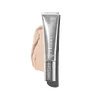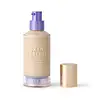What's inside
What's inside
 Key Ingredients
Key Ingredients

 Benefits
Benefits

 Concerns
Concerns

 Ingredients Side-by-side
Ingredients Side-by-side

Water
Skin ConditioningPentylene Glycol
Skin ConditioningDimethicone
EmollientSorbitol
HumectantMica
Cosmetic ColorantPropanediol
SolventCetyl PEG/PPG-10/1 Dimethicone
EmulsifyingButylene Glycol
HumectantEthylhexyl Palmitate
EmollientIsononyl Isononanoate
EmollientGlycerin
HumectantBoron Nitride
AbsorbentPhenyl Trimethicone
Skin ConditioningMaltodextrin
AbsorbentAscorbyl Tetraisopalmitate
AntioxidantSilica
AbrasiveTephrosia Purpurea Seed Extract
Skin ConditioningCaesalpinia Spinosa Fruit Extract
Skin ProtectingHelianthus Annuus Sprout Extract
Skin ConditioningSodium Hyaluronate
HumectantTheobroma Cacao Seed Butter
EmollientDimethylmethoxy Chromanol
AntioxidantGlucomannan
Skin ConditioningHonokiol
AntioxidantTriethoxycaprylylsilane
Trihydroxystearin
Skin ConditioningDisteardimonium Hectorite
StabilisingParfum
MaskingAluminum Hydroxide
EmollientCI 77891
Cosmetic ColorantCI 77491
Cosmetic ColorantCI 77492
Cosmetic ColorantCI 77499
Cosmetic ColorantWater, Pentylene Glycol, Dimethicone, Sorbitol, Mica, Propanediol, Cetyl PEG/PPG-10/1 Dimethicone, Butylene Glycol, Ethylhexyl Palmitate, Isononyl Isononanoate, Glycerin, Boron Nitride, Phenyl Trimethicone, Maltodextrin, Ascorbyl Tetraisopalmitate, Silica, Tephrosia Purpurea Seed Extract, Caesalpinia Spinosa Fruit Extract, Helianthus Annuus Sprout Extract, Sodium Hyaluronate, Theobroma Cacao Seed Butter, Dimethylmethoxy Chromanol, Glucomannan, Honokiol, Triethoxycaprylylsilane, Trihydroxystearin, Disteardimonium Hectorite, Parfum, Aluminum Hydroxide, CI 77891, CI 77491, CI 77492, CI 77499
Water
Skin ConditioningIsododecane
EmollientIsononyl Isononanoate
EmollientIsostearyl Neopentanoate
EmollientPropanediol
SolventPentaerythrityl Tetraisostearate
EmollientCetyl PEG/PPG-10/1 Dimethicone
EmulsifyingDiphenyl Dimethicone
EmollientPEG-30 Dipolyhydroxystearate
EmulsifyingSilica Dimethyl Silylate
EmollientEthylhexyl Palmitate
EmollientPullulan
Polymethylsilsesquioxane
Sodium Hyaluronate
HumectantTrihydroxystearin
Skin ConditioningPropylene Carbonate
SolventHdi/Trimethylol Hexyllactone Crosspolymer
Ethylhexylglycerin
Skin ConditioningDisteardimonium Hectorite
StabilisingEthylene/Propylene/Styrene Copolymer
Butylene/Ethylene/Styrene Copolymer
Triethoxycaprylylsilane
Phenoxyethanol
PreservativeSodium Chloride
MaskingSodium Dehydroacetate
PreservativeAluminum Hydroxide
EmollientDisodium EDTA
Pentaerythrityl Tetra-Di-T-Butyl Hydroxyhydrocinnamate
AntioxidantCI 77891
Cosmetic ColorantCI 77491
Cosmetic ColorantWater, Isododecane, Isononyl Isononanoate, Isostearyl Neopentanoate, Propanediol, Pentaerythrityl Tetraisostearate, Cetyl PEG/PPG-10/1 Dimethicone, Diphenyl Dimethicone, PEG-30 Dipolyhydroxystearate, Silica Dimethyl Silylate, Ethylhexyl Palmitate, Pullulan, Polymethylsilsesquioxane, Sodium Hyaluronate, Trihydroxystearin, Propylene Carbonate, Hdi/Trimethylol Hexyllactone Crosspolymer, Ethylhexylglycerin, Disteardimonium Hectorite, Ethylene/Propylene/Styrene Copolymer, Butylene/Ethylene/Styrene Copolymer, Triethoxycaprylylsilane, Phenoxyethanol, Sodium Chloride, Sodium Dehydroacetate, Aluminum Hydroxide, Disodium EDTA, Pentaerythrityl Tetra-Di-T-Butyl Hydroxyhydrocinnamate, CI 77891, CI 77491
Ingredients Explained
These ingredients are found in both products.
Ingredients higher up in an ingredient list are typically present in a larger amount.
Aluminum Hydroxide is a form of aluminum. It can be naturally found in nature as the mineral gibbsite. In cosmetics, Aluminum Hydroxide is used as a colorant, pH adjuster, and absorbent.
As a colorant, Aluminum Hydroxide may add opacity, or reduce the transparency. Aluminum hydroxide is contains both basic and acidic properties.
According to manufacturers, this ingredient is an emollient and humectant. This means it helps hydrate the skin.
In medicine, this ingredient is used to help relieve heartburn and help heal ulcers.
There is currently no credible scientific evidence linking aluminum hydroxide in cosmetics to increased cancer risk.
Major health organizations allow the use of aluminum hydroxide in personal care products and have not flagged it as a carcinogenic risk at typical usage levels.
Learn more about Aluminum HydroxideThis ingredient is a high molecular weight silicone. It has emulsifying and skin conditioning properties.
Ci 77491 is also hydrated iron III oxide. It's sole purpose is to give a red/pink hue to products.
Iron III oxides are classified as inorganic chemicals for coloring.
Synthetically created Ci 77491 is considered safer than those naturally found. This is because the synthetically created version may contain less impurities. Iron oxides are generally non-toxic and non-allergenic.
Learn more about CI 77491Ci 77891 is a white pigment from Titanium dioxide. It is naturally found in minerals such as rutile and ilmenite.
It's main function is to add a white color to cosmetics. It can also be mixed with other colors to create different shades.
Ci 77891 is commonly found in sunscreens due to its ability to block UV rays.
Learn more about CI 77891Disteardimonium Hectorite comes from the clay mineral named hectorite. It is used to add thickness to a product.
It can also help stabilize a product by helping to disperse other ingredients.
Hectorite is a rare, white clay mineral.
Learn more about Disteardimonium HectoriteEthylhexyl Palmitate, also known as octyl palmitate, is created from 2-ethylhexyl alcohol and palmitic acid. It is a fatty acid ester.
The fatty acid content of Ethylhexyl Palmitate makes it an emollient. Emollients help soften and hydrate your skin by trapping moisture within.
Ethylhexyl Palmitate is also used to help improve the texture of cosmetics. It helps other ingredient dissolve in products and help disperse ingredients more evenly.
You'll likely find this ingredient in sunscreen, as it is often used to mix UV-blocking ingredients such as avobenzone and ethylhexyl triazone.
It can also help stabilize the fragrances in a product as a fragrance fixative.
Ethylhexyl Palmitate can be used to substitute mineral oil.
Due to its high fatty acid content, it may not be fungal-acne safe.
Learn more about Ethylhexyl PalmitateIsononyl Isononanoate is a synthetic skin-conditioner and texture enhancer. It is created from nonanoic acid, a fatty acid found in cocoa and lavender oil.
As an emollient, Isononyl Isononanoate helps keep your skin soft and smooth. This is because emollients create a barrier on the skin to trap moisture in.
Isononyl Isononanoate helps give products a velvet feel and improves spreadability.
Learn more about Isononyl IsononanoatePropanediol is an all-star ingredient. It softens, hydrates, and smooths the skin.
It’s often used to:
Propanediol is not likely to cause sensitivity and considered safe to use. It is derived from corn or petroleum with a clear color and no scent.
Learn more about PropanediolSodium Hyaluronate is hyaluronic acid's salt form. It is commonly derived from the sodium salt of hyaluronic acid.
Like hyaluronic acid, it is great at holding water and acts as a humectant. This makes it a great skin hydrating ingredient.
Sodium Hyaluronate is naturally occurring in our bodies and is mostly found in eye fluid and joints.
These are some other common types of Hyaluronic Acid:
Learn more about Sodium HyaluronateTriethoxycaprylylsilane is a silicone used to bind and stabilize ingredients.
As an emulsifier, it helps prevent ingredients from separating. This can help elongate the shelf life of products.
Triethoxycaprylylsilane is often used to coat mineral sunscreens ingredients to help give a better feel. It also helps reduce oxidative stress in sunscreens.
Learn more about TriethoxycaprylylsilaneThis ingredient comes from Hydroxystearic Acid, a fatty acid, and glycerin. It is used to thicken oils.
Due to its fatty acid content, it is a natural emollient.
Creating trihydroxystearin involves using a chemical reaction between hydrogen and castor oil.
This ingredient may not be Malassezia folliculitis safe.
Learn more about TrihydroxystearinWater. It's the most common cosmetic ingredient of all. You'll usually see it at the top of ingredient lists, meaning that it makes up the largest part of the product.
So why is it so popular? Water most often acts as a solvent - this means that it helps dissolve other ingredients into the formulation.
You'll also recognize water as that liquid we all need to stay alive. If you see this, drink a glass of water. Stay hydrated!
Learn more about Water